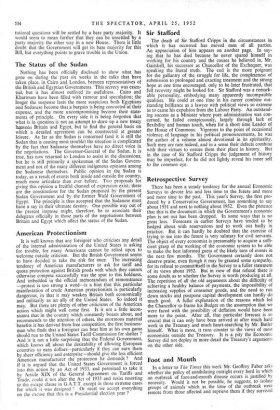The Status of the Sudan
Nothing has been officially disclosed to show what has gone on during the past six weeks in the talks that have taken place, in Cairo and London, between representatives of the British and Egyptian Governments. This secrecy was essen- tial, but it has almost outlived its usefulness. Cairo and Khartoum have been filled with rumour and speculation; the longer the suspense lasts the more suspicious both Egyptians and Sudanese become that a bargain is being concocted at their expense, and the more uncompromising become their state- ments of principle. On every side it is being forgotten that what is in question is not an attempt to draw up a new treaty beAveen Britain and Egypt, but to find the general basis on which a detailed agreement can be constructed at greater leisure. As far as the Sudan is concerned (and it is still the Sudan that is causing most trouble) the situation is complicated by the fact that Sudanese themselves have no direct voice in the negotiations. The Governor-General of the Sudan, it is true, has now returned to London to assist in the discussions, but he is still primarily a spokesman of the Sudan Govern- ment and not of the many different indigenous opinions among the Sudanese themselves. Public opinion in the Sudan is today, as a result of events both inside and outside the country, much more articulate than ever before. Two proposals for giving this opinion a fruitful channel of expression exist; these are the constitutions for the Sudan proposed by the present Sudan Government and by the former Wafd Government of Egypt. The principle is thus accepted that the Sudanese must have a say in their ultimate destiny. One possible way out of the present impasse might, therefore, be to associate their delegates officially in those parts of the negotiations between Britain and Egypt which affect the status of the Sudan.


































 Previous page
Previous page